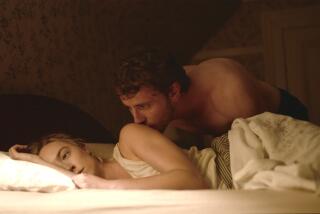MOVIE REVIEW : ‘Strapless’: The Plot Just Doesn’t Hold Up
- Share via
“Strapless,” written and directed by David Hare, is supposed to be a romantic movie for literate grown-ups. In other words, there’s not a whole lot of yelling and hair-pulling and laughter--there’s not a whole lot of life.
All this dull anomic melancholy is nevertheless meant to signify the currents of cultured passion. Hare, best known as the playwright of “Plenty,” is indulging in a subtle, snobby high-art game here. By stifling the messiness of romantic emotion, he’s aiming for a “higher” truth cleansed of “common” feeling. The educated bourgeois sufferers in “Strapless” (at selected theaters) indulge their sorrows as if they were expensive pets.
Blair Brown is Lillian, an American working for the past 12 years in London as a hospital physician. Vacationing abroad for a week, nursing the breakup of a long-term relationship with an actor, she finds herself being romanced by Raymond Forbes (Bruno Ganz), a mysterious, well-tailored gent who doesn’t blink very much. Her retreat from his advances only sparks his ardor; he traces her back to London and proceeds to court her shamelessly, buying her everything from flowers to horses to BMWs. His hand-dog mooniness finally gets to her, even though she knows precious little about him except that he’s some kind of bullion entrepreneur and that he speaks his heavily accented English exceedingly slowly, in complete sentences.
Raymond’s otherworldly passion is meant to contrast with Lillian’s pinched reserve. Even though she’s an able doctor, she doesn’t draw much emotional sustenance from her work. Her career has closed off her life; she gives and gives and, in the film’s narrow terms, gets nothing back. When Raymond cajoles her with a marriage offer, asking her if she’s ever wanted to do something “that didn’t entirely make sense,” she’s primed to respond.
“Strapless” (rated R) has a super-sophisticated veneer but it’s really just an artsy variant on the lonely-spinster-on-vacation-finds-love-with-a-mysterious-stranger scenario. It’s “Summertime” with British damp. Hare wants us to recognize that, despite Lillian’s professional role as healer, she’s in need of emotional repair herself. It’s too neat a formulation. Lillian’s romantic renewal seems preordained; it’s like the working out of a theorem. In any case, since she doesn’t seem to be banking too many fires, her Raymond-inspired “release” has no heat. She’s still the same vaguely happy, vaguely sad woman at the end as she was at the beginning. And Raymond is the same cipher.
No doubt Hare intends all this to be a more modern and adult version of what love is really like. No fireworks, just a few spluttering sparklers. But the cultivated high tone of these quasi-lovers isn’t necessarily so realistic; by dampening their passions, Hare is foisting his own version of “Invasion of the Body Snatchers” on us. Lillian and Raymond are such tony sufferers they’re practically pod people.
The only member of the cast who creates a stir is Bridget Fonda, playing Lillian’s younger sister. Fonda’s Amy, an aspiring clothes designer who camps out in Lillian’s apartment with an assortment of mod friends, has the life force that Hare denies the rest of his characters. Fonda has a sequence in which she recoils before her sister’s wrath, and another when she returns that wrath, that are so finely felt that it’s as if we were watching the emergence of a major actress right before our eyes. Amy is in the movie to give the film a classic balance. She and Lillian, so different on the surface, share the same plight. They’re “strapless,” at large in a world where their faith is not soon repaid.
Fonda’s ferocity upsets this too-neat balance. If only the film belonged to her.
More to Read
Only good movies
Get the Indie Focus newsletter, Mark Olsen's weekly guide to the world of cinema.
You may occasionally receive promotional content from the Los Angeles Times.










